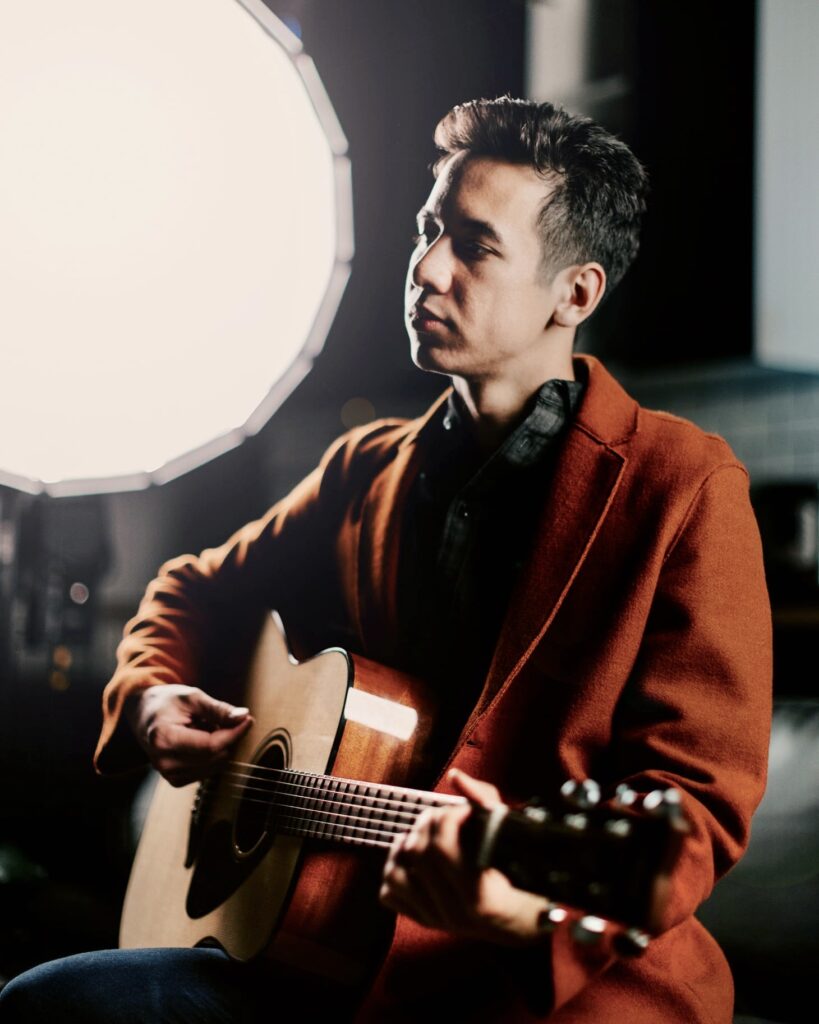Learning how to captivate your audience on stage is a trainable skill you can develop any time.
In this guide, I will show you how to have stage presence for singers and help you create an unforgettable performance for both your audience and yourself.
Plus, I go over some simple hacks to you can instantly implement as a stage musician if you notice if things are getting a bit awkward.
So let’s get started.
______
What Is Stage Presence?
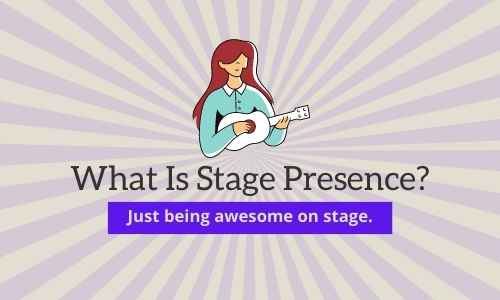
Stage presence is the ability for performers on stage to draw and command their audience’s full attention.
Whether you are trying to develop stage presence for dancers or singers, learning how to command attention is an essential skill you need when you are on stage.
Good stage presence is like being completely absorbed into an amazing movie where you aren’t paying attention to anything else (I’m sure you had those Netflix binges before…)
This is the same feeling you want your audience to feel when they see you perform live on stage.
The best part?
Anyone can learn how to develop stage presence if you put in the work and effort.
And it’s not just useful for singing, but developing stage presence can help you with:
- Playing the guitar on stage…
- Public speaking to a live audience…
- And just feeling confident on stage…
And when you are mastering stage presence, you can turn yourself from a decent performer to a potential superstar (Yes, it’s that important…)
So now let’s get started.
______
1. Learn From Your Favorite Artists
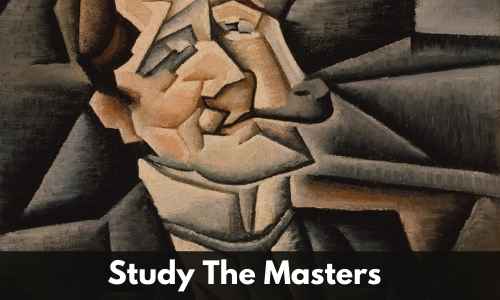
The fastest way to learn stage presence is to study from the masters who already have it.
You know, stage musicians like:
- Michael Jackson
- Freddie Mercury
- Beyonce
- Ed Sheeran
These are singers with great stage presence.
Have you noticed that when they perform on stage 9 times out of 10, the audience goes wild?
And not only that, but when the concert is over people say that listening to their music and going to their actual concert just feels different.
Sure, they have amazing voices (and I love listening to their songs…) but they are doing something on stage that makes the audience have an unforgettable night.
Here’s how you can learn from the greats: Start going to your favorite concerts and just start being aware of how you feel when they do certain things on stage.
For example. Start noticing things like how they:
- get the audience to yell and get excited…
- Tell stories and jokes between songs…
- Move throughout the show…
And start imitating how they perform on stage for your own performance.
Sometimes they are just improvising, but most of the time many of the things they do on stage have been rehearsed multiple times so they can feel confident when they are performing live.
If you can’t go to your favorite concert because you don’t have the time or budget, the next best alternative is to view it on Youtube and watch their every movement.
Here’s a stage presence example: Look at Freddie Mercury challenging the audience to sing along with him below…
And at 0:17 notice the facial expressions he is making.
I’m sure that he’s genuinely having fun with his audience as he is singing passionately, and it’s something that you can consider adding to your own performance.
It’’s noticing the tiny details like this where you can start adding to your performance.
______
2. Practice In Low-Stake Places

The next best way to develop presence as a stage musician is to practice in low-stake areas.
What this means is that you want to perform at places where there isn’t too much pressure if you make mistakes, and also have the chance to experiment on things to try out on stage.
For example, some places you can practice:
- Singing in front of your dog…
- Playing in front of your family…
- Performing for your friends…
- Performing at a local coffee shop…
- Playing at a public piano…
- Playing on the street…
- Playing in the subway…
And your goal is to get used to people hearing and watching you play before you go live on stage.
You want to build up real-life examples that you can perform on stage so that you will be less nervous when you perform in front of thousands of people.
Because the biggest problem most beginners make is that they prepare too much without building any real experience.
It’s okay to be nervous on stage, but it shouldn’t hinder you in your performance.
Because if you are going to feel embarrassed performing in front of your parents, how are you going to feel when you are performing in front of thousands of strangers?
______
3. Record Yourself On Camera
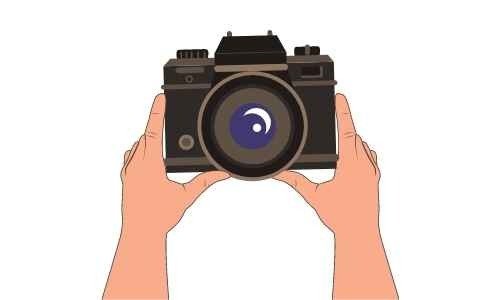
Recording and analyzing yourself is hands down the best way to improve your stage presence by yourself…
Without being on an actual stage, of course.
Recording and analyzing yourself does three things for you:
- It helps you notice your body language throughout the session…
- It can highlight some mistakes you don’t realize unless you look at it from another perspective…
- And it gives you room to make mistakes…
This is important because it shows you exactly how you look from your audience’s perspective.
This is huge because what you feel like you’re doing and how you look can be two completely different things.
Here are some questions to consider when you are analyzing yourself:
- Does my posture and voice look okay?
- Are there moments where there is low energy and can I fix it?
- Can I do something else that would naturally capture their attention?
For example, let’s say you are performing and you feel great during your practice session.
But when you look at the recordings, you notice that your head is tilted down when you sing, which may affect how the audience views you.
It’s these little things that can make a difference to your stage presence.
______
4. It’s Not About You, It’s About The Audience.

Although there can be many benefits for yourself when you are performing on stage like:
- Getting your name out…
- Spreading your music…
- And creating relationships…
You should always remember that it’s about the audience and not solely about you.
Think about it.
If your audience wasn’t there to support you, well, you would just be performing on an empty stage.
So for every performance you want to provide them so much value that they will always support you.
This makes it easy when you aren’t sure what to do on stage because all you have to ask yourself is…
“How can I provide value to my audience?”
These can be simple things like:
- Giving high fives during the concert…
- Involving the audience to sing with you…
- Telling jokes and entertaining them in between sets…
- Doing after concert signings and talking with your fans…
And just bonding with your fans.
Even if you can’t meet up with everyone and it takes a lot of work meeting them one by one, being grateful to them is an energy that spreads and affects everyone nearby.
Plus, this is how you create loyal fans who will always support you, even when you aren’t at your best.
So be sure to make the audience have an amazing night watching your performance.
______
5. Focus On Your Body Language And Posture
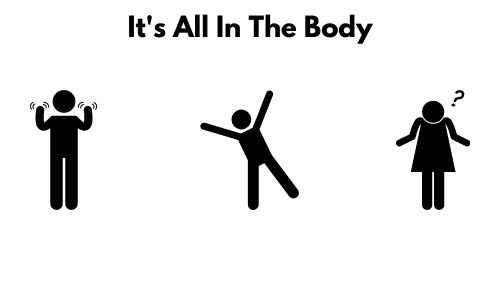
Did you know that 93% of how you communicate is solely from your body language?
This means learning how to radiate confidence from just your body is the starting point to develop an amazing stage presence.
It can be things like:
- How your body is positioned…
- How your voice sounds…
- To even what your face is doing…
And the first step to improve your body language is to be aware of what you are actually doing.
That’s why we recommended you record yourself so that you can start seeing what you are doing and make adjustments from that.
Here are some tips to consider when you are on stage:
- Are you slouching?
- Where are your eyes during the stage?
- Are you smiling or are you looking down?
- Are you exaggerating your movements?
Although the audience is watching you from afar, they can notice subtle cues unconsciously that affect how they view you.
For example, if they love your songs but you are slouching when you are singing them, they are going to feel that something is wrong and that you don’t look as confident.
You want to slightly exaggerate your movements since thewatchill be watching you from afar.
The best part about body language is that it’s something that you can fix right away.
- If you’re nervous and stuttering slightly, then you can continue to keep practicing speaking so that you feel more comfortable.
- If you notice that during some performances that your eyes look away from the audience, then look more at the audience for your next performance..
- If you notice you aren’t taking up space during the stage and you are just staying in one spot, then consider moving more.
It’s all about noticing the things that you think you do and the things that you actually do that give you room for improvement as a stage musician.
______
6. Never Announce You Feel Nervous Or Confused

This is a golden rule when you are trying to command stage presence.
You want to never announce you feel nervous or confused, even if you are 1000% sure you are nervous or confused.
Here’s why:
When you are performing on stage and say you are nervous, then it switches what the audience is focusing on.
So rather on them focusing on having an amazing performance, you are making them focus on how nervous you are.
Which spirals to making you feel even more nervous.
And you can see why that’s a bad thing.
Just remember that every famous stage musician always feels slightly nervous before going on stage, which is completely normal.
And it’s a great thing, because that means you want to put on an amazing show for your audience.
You might have self doubts like:
- Can I perform an amazing show today?
- What happens if I make a mistake?
- What happens if the audience doesn’t enjoy it?
But just remember that you should only focus on the things you can control.
Although you can’t control how the audience will react, what you can do is perform your very best.
Here’s a pro tip when you are performing on stage: Visualize your ideal confident self and copy what he would do.
Beyonce likes to call it her “Inner Sasha” where this is your ideal self that you know can put on an amazing show.
And when you imagine how this person would act, just the transformation of your body will make you feel more confident on stage.
______
7. Focus On Your Outfit

When you are watching your favorite artist on stage, you are going to notice that many of their outfits are “exaggerated.”
Like, it’s something you would see at a fashion show, but not when you’re casually sitting at a restaurant.
And they do that for a reason: They are creating a character that is “bigger than life.”
Your outfit is powerful because it can communicate to your audience how you are trying to portray yourself on stage.
For example:
- If you’re performing with a white shirt and jeans, you are telling them you are someone who is relatable…
- If you’re performing with an extravagant dress, you are telling them you are going to put on a dramatic performance.
It’s all about catering to your audience that will help you define what you will wear.
You’re going to wear something different for a rock concert compared to if you’re performing solo on an acoustic guitar.
So before you choose your outfit, ask yourself these questions:
- Who is my audience?
- And what am I trying to portray?
These two questions will help guide you to choose your best outfit for your performance.
______
8. Don’t Allow Silence

Another important rule when you are trying to command stage presence (especially as a singer) is to not allow silence during your performance.
There’s only two exceptions where silence is okay:
- The 5-10 seconds before you perform your next song (and give your voice a brief break…)
- And when you are about to perform a sad song…
And even then you want to use silence sparingly because you want your audience to feel pumped, not sad!
This is because when you don’t allow silence, then you are keeping up the energy throughout the performance.
You want to create the same feeling where you are watching an engaging movie and you don’t want to miss a second of it.
There’s really two techniques that help with breaking the silence:
- Chatting with the audience and telling jokes…
- Or having them sing along with you…
And when you are making sure the energy is up, it radiates to the surrounding people.
So this means this energy is going to affect:
- The audience members nearby…
- Your band members…
- And you…
And ideally, the energy should overall remain high for the entire performance.
It’s a lot of work, but that’s how you create an amazing night for your audience.
______
9. Smile More And Have Fun

Smiling is truly the easiest and fastest way to improve your stage presence.
It truly is.
It’s something that you can instantly do to improve how the audience views you.
The reason it’s important is that it makes you more likeable on stage.
And when more people like you, it makes it exponentially easier for you to capture their full attention.
And that’s where also having fun comes in.
When they are seeing someone that they like and want to have a connection having fun, it spreads the energy and “infects” the audience with such high energy levels that it makes them also want to have fun.
And it’s all about being present on your stage and connecting with this synergy that will make it an unforgettable performance for both you and your audience.
Sometimes, you may need to leap out of your comfort zone to create an unforgettable moment, and sometimes you just need to experiment.
But it truly comes down to one question…
“Are you enjoying yourself?”
Because if you are, then that energy is going to spread to your audience.
And they are going to love the night.
______
Frequently Asked Questions
How do you create a stage presence?
There are multiple ways to create a stage presence, but the biggest one is to focus on your body language and have fun.
Just by being confident and having fun is an energy that will infect the audience, making them feel more pumped when they watch you perform live.
Why Is Stage Presence Important?
Stage presence is important because you are trying to entertain and connect with your audience when they visit you at a live performance. Otherwise, they would just listen to your songs on Spotify without feeling the need to visit you.
How do guitarists have stage presence?
The best way to have stage presence as a guitarist is to look confident and look like you’re having fun (even better if you’re actually having fun.)
If you’re doing a solo, then you want to exaggerate your body language and taking up space for your performance.
It’s really the little things about your body language and how you interact with your audience is what will develop your stage presence.
______
Conclusion
In this guide I showed you how to have stage presence for singers, dancers, and guitarists where you want to enrapture your audience with an amazing performance.
It doesn’t matter if you are a beginning vocalist or advanced singer as stage presence is an entirely different skill you need to learn.
We go over what a stage musician needs to do by focusing on their body language and outfits, and copying their favorite artists when they perform live.
We also go over some tips on how to interact with your audience and how practicing in low-stake areas will develop your confidence.
Let me know in the comments below if you still feel nervous when you are performing on stage and how you worked on getting better!


